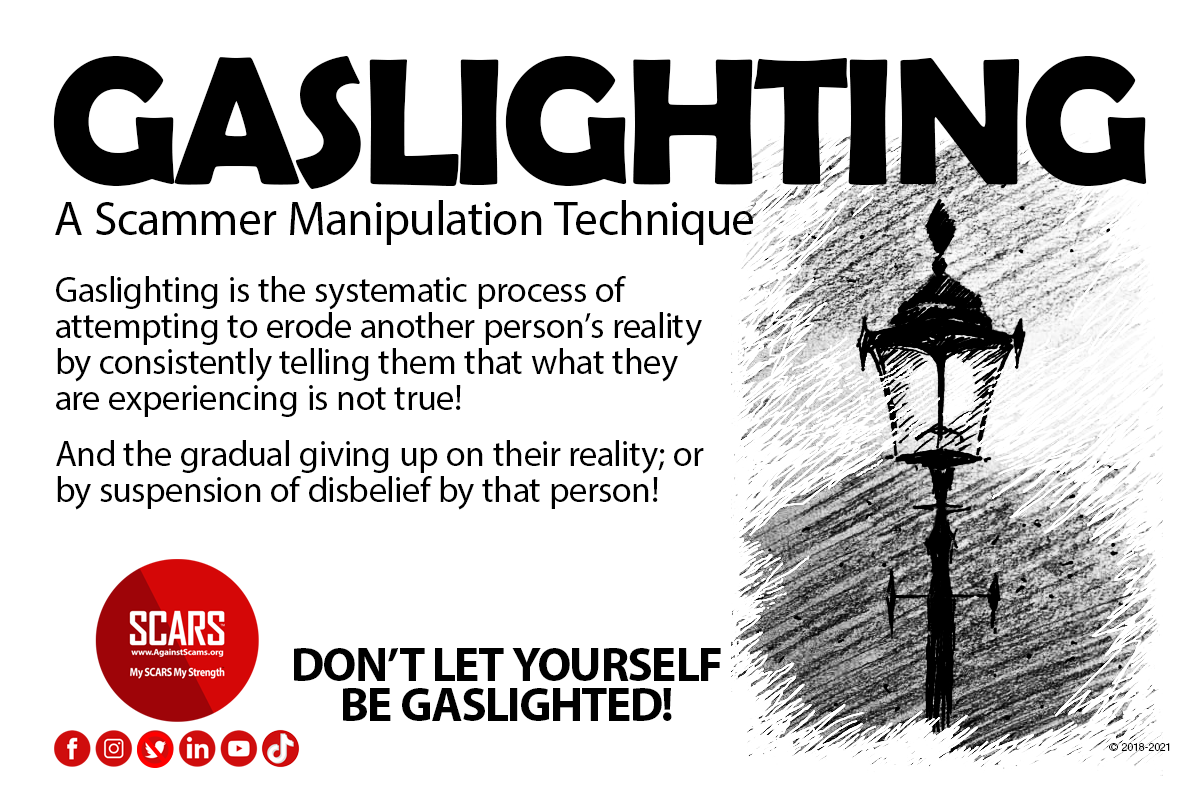Article Abstract
Gaslighting, derived from the 1938 play “Gas Light” and its film adaptations, is a scammer/fraudster manipulative tactic synonymous with psychological abuse. Stemming from a narrative where a husband manipulates his wife into doubting her reality, gaslighting pervades various interactions, including scams. Scammers strategically employ gaslighting to erode victims’ confidence, blur reality, isolate them, manipulate emotions, and evade accountability.
Gaslighting in scams aims to distort victims’ perceptions, making them doubt their judgment and emotions. To counter gaslighting, victims must educate themselves, trust their instincts, seek validation from trusted sources, maintain records, set boundaries, practice self-care, seek professional support, challenge negative self-talk, stay informed, and focus on personal growth.
By prioritizing mental and emotional well-being and accessing support networks like SCARS, victims can reclaim agency, resist manipulation, and embark on the path to healing and recovery. Gaslighting awareness is crucial in creating a safer digital environment and empowering individuals against psychological exploitation.
Gaslighting: The Manipulative Tactic and Its Use Against Scam Victims in Scams
Gaslighting, a term coined from the 1938 play “Gas Light” and its film adaptations by Alfred Hitchcock, has become synonymous with psychological manipulation and emotional abuse.
Originating from the storyline where a husband subtly manipulates his wife into questioning her reality, the technique has found its way into various aspects of human interaction, including scams, domestic abuse, politics, corporate misdirection, and so many more. This insidious tactic, characterized by the gradual erosion of a victim’s confidence and sanity, is a powerful tool for scammers seeking to exert control over their targets.
A Historical Perspective
The concept of gaslighting predates its theatrical debut, with historical instances of similar manipulative tactics documented throughout human history. However, it wasn’t until the play “Gas Light” by Patrick Hamilton premiered that the term gained widespread recognition. Set in Victorian London, the story revolves around a husband who deliberately dims the gas lights in their home and denies it when questioned by his wife, leading her to doubt her perceptions and sanity.
The term “gaslighting” entered the popular lexicon as a shorthand for psychological manipulation, capturing the essence of tactics aimed at distorting an individual’s reality and undermining their sense of self. In the decades since, psychologists and mental health professionals have extensively studied gaslighting, recognizing its harmful effects on victims’ mental well-being and relationships.
Gaslighting in Scams
Scammers, adept at exploiting psychological vulnerabilities, almost always employ gaslighting techniques to manipulate their victims and maintain control over them.
Gaslighting serves several strategic purposes:
- Undermining Confidence: Scammers employ gaslighting to erode their victims’ confidence and self-trust, making them more susceptible to manipulation. By casting doubt on the victim’s judgment and perceptions, scammers create a dependency dynamic where the victim relies on the scammer for validation and guidance.
- Blurring Reality: Gaslighting in scams involves distorting reality and manipulating the victim’s perception of the situation. Scammers may deny or downplay evidence of their fraudulent activities, dismiss the victim’s concerns as unfounded, or fabricate alternate narratives to confuse and disorient them. This deliberate obfuscation of truth leaves the victim vulnerable and unsure of what to believe.
- Isolating the Victim: This is probably its most important function for scammers in the course of executing scams or fraud. Gaslighting often accompanies tactics aimed at isolating the victim from their support network. Scammers may disparage friends and family members, portraying them as untrustworthy or unsupportive, while positioning themselves as the victim’s sole ally and confidant. This isolation further reinforces the victim’s reliance on the scammer and reduces their likelihood of seeking help or intervention.
- Manipulating Emotions: Gaslighting exploits the victim’s emotions, amplifying feelings of guilt, shame, and inadequacy. Scammers may use tactics such as guilt-tripping, blame-shifting, or invalidating the victim’s emotions to exert control and maintain dominance. By keeping the victim in a constant state of emotional turmoil, scammers make it harder for them to think critically and assert their autonomy.
- Gaslighting as a Defense Mechanism: In some cases, scammers resort to gaslighting as a preemptive defense mechanism to deflect suspicion and accountability. By casting doubt on the victim’s perceptions and memories, scammers aim to evade detection and avoid facing consequences for their actions. This tactic allows them to perpetuate the scam and continue exploiting the victim without fear of repercussions.
Combating Gaslighting in Scams
Recognizing gaslighting tactics is the first step in protecting oneself from manipulation and exploitation in scams. Victims should remain vigilant for red flags indicating attempts to distort reality, undermine confidence, or manipulate emotions. Seeking validation from trusted sources, maintaining open communication with friends and family, and educating oneself about common scam tactics can help inoculate against gaslighting attempts.
Spotting Gaslighting
Gaslighting is a manipulative tactic where the perpetrator seeks to distort the victim’s perception of reality, making them doubt their own thoughts, feelings, and experiences. Gaslighting can further exacerbate the trauma and emotional distress due to the cognitive dissonance this causes when the scam or fraud is discovered.
Here are typical ‘red flag‘ statements that gaslighters commonly use, serving as immediate red flags for victims. Did you experience any of these?
- “You are just being paranoid.”
- “I never said/did that. You must be mistaken.”
- “You are overreacting. It wasn’t that big of a deal.”
- “You are too sensitive. Can’t you take a joke?”
- “You must have misunderstood. I meant something else entirely.”
- “Why are you always so negative? Can’t you see the positive side?”
- “You are imagining things. That never happened.”
- “You are just looking for attention.”
- “You are making a mountain out of a molehill.”
- “You are crazy if you believe that.”
- “You are just being difficult.”
- “You are so gullible. How could you fall for something like that?”
- “You are the one who’s at fault here, not me.”
- “You are too trusting. You need to be more skeptical.”
- “You are just trying to blame me for everything.”
- “You are exaggerating. It wasn’t as bad as you’re making it out to be.”
- “You are so naive. Can’t you see what is really going on?”
- “You are delusional if you think that’s true.”
- “You are just being insecure.”
- “You are being irrational. You need to calm down.”
- “You are being melodramatic.”
- “You are remembering it wrong. That’s not how it happened.”
- “You are always making a fuss about nothing.”
- “You are too emotional. You need to toughen up.”
- “You are just trying to make me feel guilty.”
- “You are just being overly dramatic.”
- “You are imagining things again. It’s all in your head.”
- “You are too sensitive. Stop taking everything so personally.”
- “You are just being difficult for no reason.”
- “You are so naive. I can’t believe you fell for that.”
- “You are making things up to make me look bad.”
- “You are just trying to cause trouble.”
- “You are too emotional. You need to learn to control yourself.”
- “You are being paranoid. There’s nothing to worry about.”
- “You are just being irrational. Your thoughts don’t make sense.”
- “You are always so negative. Can’t you ever be positive?”
- “You are too insecure. You need to work on your self-esteem.”
- “You are just too trusting. Not everyone has good intentions like you.”
- “You are always playing the victim.”
- “You are just being stubborn.”
- “You are exaggerating again. It’s not as bad as you say.”
- “You are too gullible. How can you believe everything you hear?”
- “You are just being selfish.”
- “You are making a big deal out of nothing.”
- “You are too suspicious. You need to learn to trust people.”
- “You are always looking for problems where there aren’t any.”
- “You are just being insecure about yourself.”
- “You are too weak. You need to toughen up and deal with it.”
- “You are imagining things. That’s not what really happened.”
- “You are just trying to get attention.”
These statements are designed to undermine the victim’s confidence and create doubt in their perceptions, ultimately allowing the gaslighter to maintain control and manipulate the situation to their advantage.
Recognizing these red flags is essential for scam victims to protect themselves from further psychological harm and seek support to validate their experiences.
NOTE: you may have heard or observed these said in ‘normal’ relationships as well. They are always derogatory, however, they may not always be mean to be gaslighting. We should all be aware of how we use derogatory phrasing throughout our normal lives with or without intention.
Overcoming Gaslighting You Experienced
How can a scam victim counter gaslighting employed against them to recover more quickly?
Counteracting gaslighting employed by scammers against scam victims requires a multi-faceted approach aimed at reclaiming agency, rebuilding confidence, and rebuilding resilience.
Here are several strategies that scam victims can employ to recover more quickly from this form of psychological manipulation:
- Educate Yourself: Knowledge is power when it comes to recognizing and resisting gaslighting tactics. Educate yourself about common scam techniques, including gaslighting, and familiarize yourself with the red flags indicative of manipulation. Understanding how gaslighting works can help you regain perspective and assert your autonomy.
- Trust Your Logic: Gaslighting often involves undermining your intuition and gut instincts. Trust yourself and your perceptions, even when others try to cast doubt on them. If something feels off or too good to be true, it likely is. Don’t dismiss your inner voice in favor of external validation. However, remember that your instincts and decision-making did not work so well when you said hello to a stranger!
- Seek Validation from Trusted Sources: Surround yourself with supportive friends, family members, or professionals who can validate your experiences and provide perspective. Share your concerns with trusted individuals who have your best interests at heart and can offer objective feedback without judgment.
- Keep Records: Maintain thorough documentation of your interactions with scammers, including emails, messages, and financial transactions. Having a record of the scammer’s deceitful behavior can serve as concrete evidence of their manipulation and help validate your reality if doubts arise. Looking back on these, while difficult can actually help counter that manipulative fantasies the scammers built in the victim’s mind.
- Set Boundaries: Establish clear boundaries with the scammers and assertively cut them off completely – do not confront them, just end all contact and block them. Refuse to engage in conversations or even read their messages that make you uncomfortable or compromise your well-being. Setting boundaries reinforces your sense of self and prevents further manipulation.
- Practice Self-Care: Prioritize self-care activities that promote mental and emotional well-being, such as mindfulness meditation, exercise, journaling, and spending time in nature. Engage in activities that bring you joy and relaxation, and prioritize your needs above the demands of the scammer. Journalling is especially important since it allows you to see the progress you are making in changing your perspectives.
- Seek Professional Support: All scam victims should seek support from qualified professionals, such as therapists or counselors, who specialize in trauma recovery and psychological manipulation. Therapy can provide a safe space to process your experiences, validate your emotions, and develop coping strategies for overcoming gaslighting.
- Challenge Negative Self-Talk: Combat the negative self-talk and self-doubt instilled by gaslighting by practicing self-compassion and positive affirmations. Remind yourself of your inherent worth and resilience, and challenge the distorted beliefs perpetuated by the scammer.
- Stay Informed: Stay informed about scam prevention and recovery resources available, such as from SCARS. Organizations such as the Society of Citizens Against Relationship Scams (SCARS) provide support, education, and advocacy for scam victims, helping them navigate the aftermath of exploitation. Visit www.ScamVictimSupport.org for more information.
- Focus on Personal Growth: Use the experience of being gaslit by scammers as an opportunity for personal growth and empowerment. Channel your resilience and determination into constructive pursuits, such as learning new skills, pursuing hobbies, or volunteering in your community or with SCARS. By focusing on personal growth, you can reclaim your sense of agency and move forward with confidence.
Ultimately, recovering from gaslighting employed by scammers requires patience, self-awareness, and resilience. By employing these strategies and seeking support from trusted sources, scam victims can counteract manipulation, regain their sense of self, and embark on the path to healing and recovery.
Prioritize Their Mental and Emotional Well-being
Furthermore, victims should prioritize their mental and emotional well-being by seeking support from qualified professionals, such as therapists or counselors, or trauma-informed support groups, who can provide guidance and validation in surviving the aftermath of a scam. By reclaiming agency over their reality and asserting boundaries against manipulation, victims can mitigate the harmful effects of gaslighting and begin the journey toward healing and recovery.
Summary
In conclusion, gaslighting is a potent psychological weapon used by scammers to exert control and exploit vulnerabilities in their victims. Understanding the history and tactics of gaslighting is essential for recognizing and resisting manipulation in scam situations. By empowering victims with knowledge, validation, and support, we can combat gaslighting and create a safer digital environment for all.
Statement About Victim Blaming
Some of our articles discuss various aspects of victims. This is both about better understanding victims (the science of victimology) and their behaviors and psychology. This helps us to educate victims/survivors about why these crimes happened and to not blame themselves, better develop recovery programs, and to help victims avoid scams in the future. At times this may sound like blaming the victim, but it does not blame scam victims, we are simply explaining the hows and whys of the experience victims have.
These articles, about the Psychology of Scams or Victim Psychology – meaning that all humans have psychological or cognitive characteristics in common that can either be exploited or work against us – help us all to understand the unique challenges victims face before, during, and after scams, fraud, or cybercrimes. These sometimes talk about some of the vulnerabilities the scammers exploit. Victims rarely have control of them or are even aware of them, until something like a scam happens and then they can learn how their mind works and how to overcome these mechanisms.
Articles like these help victims and others understand these processes and how to help prevent them from being exploited again or to help them recover more easily by understanding their post-scam behaviors. Learn more about the Psychology of Scams at www.ScamPsychology.org
More About Gaslighting and Manipulation:
- What is the Purpose of Gaslighting? (romancescamsnow.com)
- Gaslighting – Destroying A Victim’s Sense Of Reality Or Truth [Updated] (romancescamsnow.com)
- SCARS In-The-Moment Questions Intervention Technique For Scam Victims – 2024 (romancescamsnow.com)
- Paradoxical Persuasion – A Scammer Psychological Manipulation Technique 2023 (romancescamsnow.com)
- Scammers Anger – Losing Their Temper – How Scammers Operate (romancescamsnow.com)
- Scam Victim Isolation (romancescamsnow.com)
- Suggestibility & Scam Victims (romancescamsnow.com)
SCARS Resources:
- Getting Started Right: ScamVictimsSupport.org
- Sextortion Scam Victims: Sextortion Victims Support – The Essentials (scamvictimssupport.org)
- For New Victims of Relationship Scams newvictim.AgainstScams.org
- Subscribe to SCARS Newsletter newsletter.againstscams.org
- Sign up for SCARS professional support & recovery groups, visit support.AgainstScams.org
- Join our Scam Survivors United Chat & Discussion Group facebook.com/groups/scam.survivors.united
- Find competent trauma counselors or therapists, visit counseling.AgainstScams.org
- Become a SCARS Member and get free counseling benefits, visit membership.AgainstScams.org
- Report each and every crime, learn how to at reporting.AgainstScams.org
- Learn more about Scams & Scammers at RomanceScamsNOW.com and ScamsNOW.com
- Scammer photos ScammerPhotos.com
- SCARS Videos youtube.AgainstScams.org
- Self-Help Books for Scam Victims are at shop.AgainstScams.org
- Donate to SCARS and help us help others at donate.AgainstScams.org
- Worldwide Crisis Hotlines: https://blog.opencounseling.com/suicide-hotlines/
Other Cyber Resources
- Block Scam Domains: Quad9.net
- Global Cyber Alliance ACT Cybersecurity Tool Website: Actionable Cybersecurity Tools (ACT) (globalcyberalliance.org) https://act.globalcyberalliance.org/index.php/Actionable_Cybersecurity_Tools_(ACT)_-_Simplified_Cybersecurity_Protection
- Wizer Cybersecurity Training – Free Security Awareness Training, Phishing Simulation and Gamification (wizer-training.com)
Psychology Disclaimer:
All articles about psychology and the human brain on this website are for information & education only
The information provided in this article is intended for educational and self-help purposes only and should not be construed as a substitute for professional therapy or counseling.
While any self-help techniques outlined herein may be beneficial for scam victims seeking to recover from their experience and move towards recovery, it is important to consult with a qualified mental health professional before initiating any course of action. Each individual’s experience and needs are unique, and what works for one person may not be suitable for another.
Additionally, any approach may not be appropriate for individuals with certain pre-existing mental health conditions or trauma histories. It is advisable to seek guidance from a licensed therapist or counselor who can provide personalized support, guidance, and treatment tailored to your specific needs.
If you are experiencing significant distress or emotional difficulties related to a scam or other traumatic event, please consult your doctor or mental health provider for appropriate care and support.
If you are in crisis, feeling desperate, or in despair please call 988 or your local crisis hotline.
-/ 30 /-
What do you think about this?
Please share your thoughts in a comment below!
Do You Need Support?
Get It Now!
SCARS provides the leading Support & Recovery program for relationship scam victims – completely FREE!
Our managed peer support groups allow victims to talk to other survivors and recover in the most experienced environment possible, for as long as they need. Recovery takes as long as it takes – we put no limits on our support!
SCARS is the most trusted support & education provider in the world. Our team is certified in trauma-informed care, grief counseling, and so much more!
To apply to join our groups visit support.AgainstScams.org
We also offer separate support groups for family & friends too.
Become a
SCARS STAR™ Member
SCARS offers memberships in our STAR program, which includes many benefits for a very low annual membership fee!
SCARS STAR Membership benefits include:
- FREE Counseling or Therapy Benefit from our partner BetterHelp.com
- Exclusive members-only content & publications
- Discounts on SCARS Self-Help Books Save
- And more!
To learn more about the SCARS STAR Membership visit membership.AgainstScams.org
To become a SCARS STAR Member right now visit join.AgainstScams.org
To Learn More Also Look At Our Article Catalogs
Scam & Crime Types
More SCARS
- ScamsNOW Magazine – ScamsNOW.com
- ContraEstafas.org
- ScammerPhotos.com
- AnyScam.com – reporting
- AgainstScams.org – SCARS Corporate Website
- SCARS YouTube Video Channel
















So many of the gaslighting techniques described in this article were used by my scammer. One used over and over was telling me I shouldn’t be afraid of debt as they wanted me to take out a loan against my home to finance the scam. I was told that I was being too timid and having debt was the path to wealth. I have always hated being in debt and this ended up being the trigger that made me put an end to the scam.